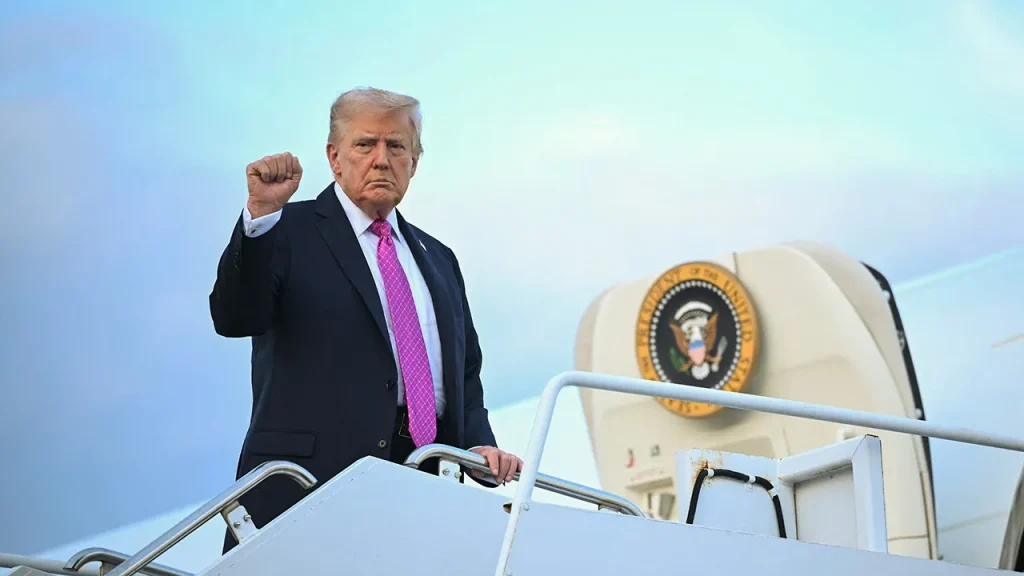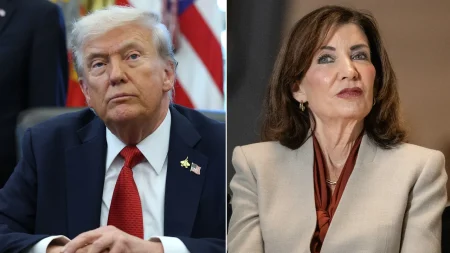Trump Addresses Possible Military Action Against Venezuela Amid Rising Tensions
In a series of statements that reflect growing tensions between the United States and Venezuela, President Donald Trump responded cautiously to questions about potential military actions against the South American nation. Speaking to reporters in Morristown, New Jersey, Trump addressed concerns about drug trafficking, migration, and the possibility of further military engagement following a recent U.S. strike on a Venezuelan vessel. His measured yet firm responses highlight an evolving approach to what his administration views as threats emanating from Venezuela under President Nicolás Maduro’s leadership.
When asked about the possibility of striking mainland Venezuela, Trump characteristically kept his options open with a vague “We’ll see what happens.” He justified potential actions by pointing to what he described as Venezuela sending “gang members, drug dealers and drugs” to the United States, declaring such activities “not acceptable.” This rhetoric comes in the context of recently escalated U.S. military presence in the Caribbean near Venezuelan waters, a move that has heightened diplomatic tensions between the two nations. The president’s comments suggest a willingness to consider more aggressive measures while remaining strategically ambiguous about specific plans.
The context for these tensions includes a recent U.S. military strike that destroyed a Venezuelan boat in the southern Caribbean, reportedly killing nearly a dozen suspected members of the Tren de Aragua (TdA) gang, which Trump’s administration had previously designated as a foreign terrorist organization. When questioned about the possibility of launching additional strikes on Venezuelan drug-smuggling vessels, Trump again responded with “We’ll see what happens,” though he noted there has been “very little boat traffic” since the U.S. increased its naval presence in the region. This observation suggests the administration views its military posturing as having already achieved some deterrent effect, potentially reducing drug trafficking activities in the area.
Trump dismissed concerns about potential escalation from Venezuelan President Maduro, who has described some U.S. actions as illegal. Instead, Trump pivoted to emphasize what he presented as the greater illegality: “What’s illegal are the drugs on the boat, and the drugs that are being sent into our country and the fact that 300 million people died last year from drugs, that’s what’s illegal.” While his figure on drug deaths appears significantly inflated compared to official statistics, his response underscores how the administration is framing its aggressive posture as necessary to combat drug trafficking and its associated harms to Americans. This framing attempts to position potential military actions as defensive measures against criminal activities rather than offensive operations against another sovereign nation.
The developing situation has been further complicated by Venezuela’s accusation that U.S. Navy personnel boarded a tuna boat with nine fishermen in Venezuelan waters, according to reports Trump did not directly address. Instead, he maintained his focus on drug trafficking and criminal organizations, stating, “A lot of drugs are coming out of Venezuela. A lot of Tren de Aragua… They’re trying to get out, but we’re stopping them successfully at the border in Venezuela.” This statement reflects the administration’s February decision to designate several drug cartels, including Tren de Aragua and the Sinaloa Cartel, as foreign terrorist organizations—a designation that provides legal authority for more aggressive enforcement actions.
The unfolding tensions between the United States and Venezuela represent a complex interplay of security concerns, migration issues, and geopolitical positioning. Trump’s responses, while lacking specific commitments to future military action, nonetheless signal a willingness to consider various options to address what his administration portrays as threats to U.S. security interests. The situation remains fluid, with both nations seemingly prepared to defend their positions—Venezuela through diplomatic protests and accusations of sovereignty violations, and the United States through continued military presence and potential further actions against what it characterizes as narco-terrorist threats. As this dynamic continues to evolve, the international community watches closely for signs of either escalation or diplomatic resolution.














